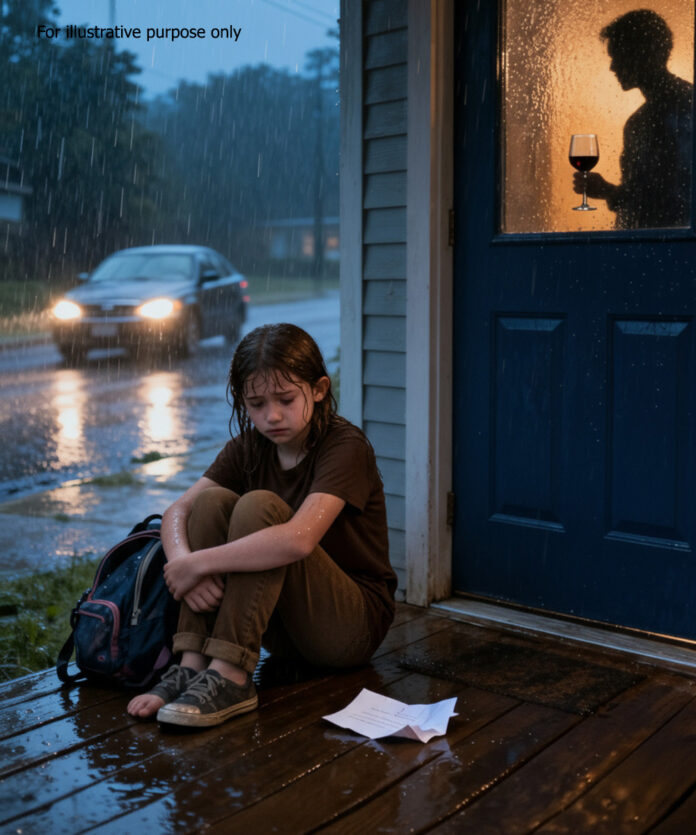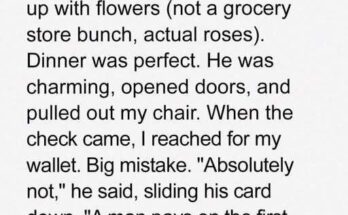It began as an ordinary Thursday — until the phone call that made my blood run cold.
“My key doesn’t work,” my daughter said, her small voice trembling. “I think they changed the lock.”
At first, I thought she must be mistaken. Who would change the locks without saying a word?
“Try again, sweetheart,” I told her. “It’s probably just stuck.”
A pause. “Grandma said we don’t live here anymore.”
And just like that, everything I’d been ignoring about my mother finally came into focus.
Locked Out in the Rain
By the time I reached the house, the sun had set and the rain had turned the driveway into a slick sheet of gray. My 11-year-old, Hannah, sat curled up under the porch light, soaked to the bone.
She looked up when I pulled in. “I’m sorry,” she whispered, as if she were the one who’d done something wrong.
“You have nothing to be sorry for,” I said, wrapping her in my coat.
The door opened. My mother stood there with a glass of wine in hand, her expression unreadable.
“Elena,” she said lightly. “What are you doing here?”
I stared at her. “You changed the locks.”
Her response was calm, rehearsed. “We needed privacy.”
“You locked my daughter out in the rain,” I said, barely recognizing my own voice.
“She’s fine,” my mother replied. “She’s 11. And we’ve decided you and Hannah don’t live here anymore. It’s better this way. Less tension.”
Behind her, my half-sister Brittany leaned against the doorframe, phone in hand, pretending discomfort.
I looked past them — saw my father’s chair replaced by Brittany’s kids watching cartoons, my daughter’s blanket folded neatly on the couch as if erased.
Something inside me went utterly still. I didn’t yell. I didn’t cry. I just said, “Understood.”
And I took my child home.
The History That Led Us Here
My mother’s cruelty didn’t start that night. It had been simmering my whole life.
When I was a child, she adored my older half-sister, Brittany. Every sneeze earned sympathy and praise. When I sneezed, I was told to keep quiet. My father, a hospital doctor, was rarely home. When he was, he gave me a pat on the shoulder and a tired smile — the kind of love you cling to when there’s no other kind around.
By nineteen, I had mistaken attention for love and ended up pregnant. Hannah’s father left soon after. Nursing school and motherhood nearly broke me, but I kept going. You don’t stop when you’re the only person your child can count on.
Three years ago, when my father’s health began to fail, my mother called. “He needs help,” she said. “You’re a nurse.”
So Hannah and I moved back into the house I grew up in. For a time, it almost felt like family again. I managed his care, and for once, my mother’s sharp edges softened — at least when others were watching.
When Dad passed away, she changed overnight. The grief lasted less than the funeral flowers. Within days she was rearranging furniture, painting rooms, and humming like she’d been waiting for this reset. My father’s bedroom became a playroom for Brittany’s kids. His books vanished. His photo disappeared from the hallway.
One night, I overheard her whispering to Brittany, “It makes sense for you to move in. Rent’s too high anyway. Elena will leave soon — she was only here for your father.”
That was when I realized: I wasn’t family. I was an inconvenience.
The Letter My Mother Never Expected
A few days later, I received a call from my father’s lawyer, Jonathan Wells. “Just some paperwork to finalize,” he said.
When I arrived, he slid a folder across the desk. “Your father transferred the house into a living trust before his death,” he explained. “It’s in your name — for you and your daughter.”
For a moment, I couldn’t breathe. My father, in his quiet way, had made sure we would always have a home.
I didn’t tell my mother. Not yet. I wanted to believe she might come to her senses. But five days later, she proved me wrong.
She changed the locks.
That night, after rescuing Hannah from the rain, I sat awake until morning — not crying, not angry, just resolute. By sunrise, I called Jonathan. “She locked us out,” I said.
He sighed. “Bring the trust documents.”
At his office, he reviewed everything carefully. “You’re the trustee,” he said. “Your mother has no legal standing. I’ll draft the eviction notice now.”
When he handed me the papers, he asked, “Do you want to serve it personally?”
I shook my head. “No. I’ve had enough doors slammed in my face.”
When the Truth Arrived on Her Doorstep
An hour later, Jonathan delivered the notice himself. I waited in the car down the street.
My mother opened the door, impatient and dismissive — until she saw the first line. Her face drained of color. Brittany appeared, snatched the papers, and began shouting.
Jonathan said something polite, perhaps explaining the law. Then he walked back to me and said simply, “Served.”
That night, I expected to feel victorious. Instead, I just felt tired — like a weight had finally slid off my chest.
But the fight wasn’t over. My mother immediately hired an attorney, claiming I had “influenced” my father while he was ill. Jonathan filed for emergency possession. I submitted a police report describing how she’d locked Hannah out in the rain. The officer’s words still echo in my mind: “That’s neglect. You did the right thing.”
Within two days, the judge signed the order. The house was legally mine again.
The Day Everything Came Full Circle
When the sheriff arrived to enforce the order, I parked down the street, heart pounding. I didn’t want Hannah to see it.
Two deputies knocked on the door. Voices rose inside — my mother’s outrage, Brittany’s wailing. The door opened, and there she stood, pointing at me from the porch. “She forged everything!”
The deputy didn’t flinch. “Ma’am, we have a court order.”
They were given fifteen minutes to gather essentials. My mother laughed in disbelief, but the deputies didn’t budge. Brittany cried. Ryan, her husband, muttered under his breath.
When my mother finally stepped out, she paused on the threshold, eyes blazing. “I hope you’re proud,” she spat.
I wasn’t. I was simply free.
A deputy handed me the keys. “Ma’am,” he said quietly, “it’s yours now.”
I stood there in the drizzle, staring at the house that had once held so much pain — now mine, not as revenge, but as peace.
A New Beginning
That evening, I picked up Hannah from school. “Are we moving again?” she asked softly.
“No,” I said. “We’re going home.”
Her eyes widened as we stepped inside. The rooms were empty, but the air felt lighter. She ran from room to room, laughing. “It’s ours again!”
“Yes,” I said, smiling for the first time in months. “It always was.”
Six months later, the quiet feels like a gift. My mother and Brittany have since turned on each other — poetic, if a bit sad. Small-town gossip travels fast: arguments, slammed doors, and yet another lock changed.
As for Hannah and me, we’ve found something we never had before — peace.
We tend the garden, watch movies on weekends, and fill the house with laughter instead of shouting. The rain doesn’t scare her anymore. She says the flowers grow faster when you stop yelling at them.
She’s right.
Because sometimes, the greatest justice isn’t revenge — it’s reclaiming your peace and teaching your child that love, when it’s real, never locks you out.



